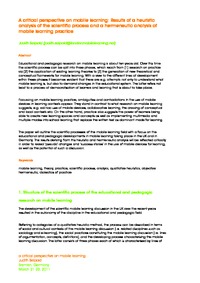
Educational and pedagogic research on mobile learning is about ten years old. Over this time the scientific process can be split into three phases, which reach from (1) research on practice via (2) the application of existing learning theories to (3) the generation of new theoretical and conceptual frameworks for mobile learning. With a view to the different lines of development within these phases it becomes evident that there are e.g. attempts not only to understand what mobile learning is, but also to demand changes in the educational system. The latter refers not least to a process of democratisation of learners and learning that is about to take place.
Focussing on mobile learning practice, ambiguities and contradictions in the use of mobile devices in learning contexts appear. They stand in contrast to what research on mobile learning suggests, e.g. ad-hoc use of mobile devices, collaborative learning, the crossing of conceptual and local contexts etc. On the other hand, practice also suggests the power of learners being able to create new learning spaces and concepts as well as implementing multimedia and multiple modes into school learning that replace the written text as dominant mode for learning.
The paper will outline the scientific processes of the mobile learning field with a focus on the educational and pedagogic developments in mobile learning taking place in the UK and in Germany. The results deriving from this heuristic and hermeneutic analysis will be reflected critically in order to reveal ‘pseudo’ changes and ‘success stories’ in the use of mobile devices for learning, as well as the potential of such a discussion.



 Diese Seite wurde seit 12 Jahren inhaltlich nicht mehr aktualisiert.
Unter Umständen ist sie nicht mehr aktuell.
Diese Seite wurde seit 12 Jahren inhaltlich nicht mehr aktualisiert.
Unter Umständen ist sie nicht mehr aktuell.













 Lernen
Lernen mobile learning
mobile learning Multimedia
Multimedia




 2
2 

 , 44 kByte)
, 44 kByte) 

 Biblionetz-History
Biblionetz-History  QR-Code dieser Seite
QR-Code dieser Seite